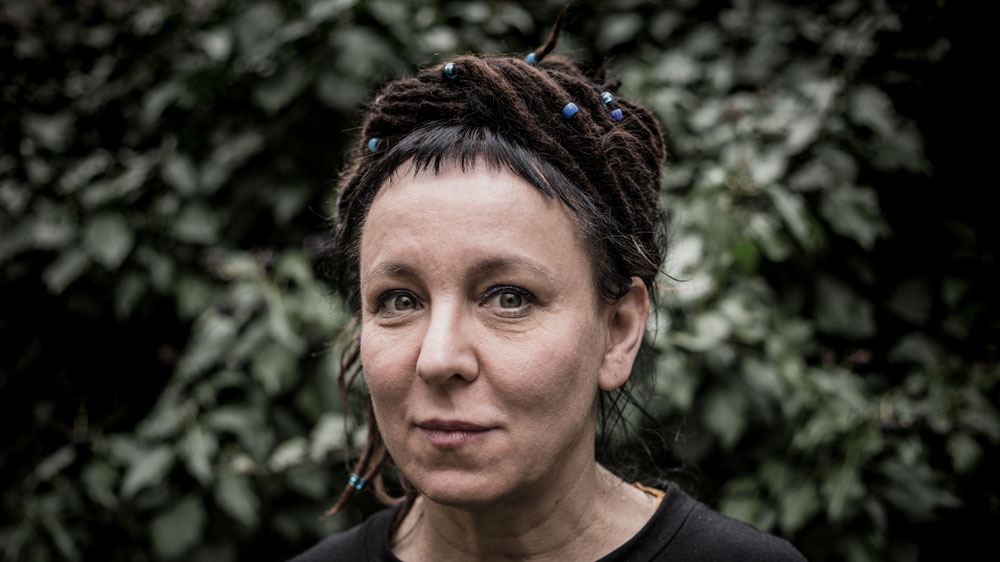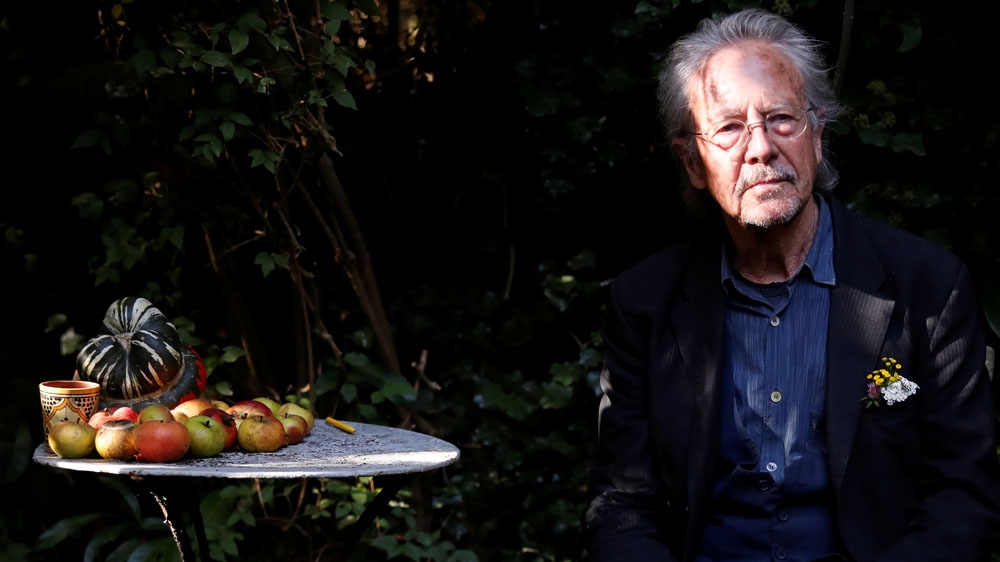Olga Tokarczuk and Peter Handke win Nobel literature prizes
The Swedish Academy names two winners after a scandal forced the 2018 prize to be postponed.
![Olga Tokarczuk and Peter Handke [AP Photo]](/wp-content/uploads/2019/10/742834ed3ca2404b99db4eaf5bb466fd_18.jpeg?resize=770%2C513&quality=80)
Polish author Olga Tokarczuk and Austrian writer Peter Handke have won Nobel Prizes for Literature, prompting celebration and disbelief.
Two prizes were given on Thursday after a sexual assault scandal forced the secretive awarding body to postpone crowning a laureate in 2018.
Keep reading
list of 4 itemsMandela’s world: A photographic retrospective of apartheid South Africa
Portrait by Gustav Klimt sells for $32m at Vienna auction
UK returns looted Ghana artefacts on loan after 150 years
Tokarczuk, a literary star in Europe, was named the winner of last year’s prize, while the 2019 award went to the influential and controversial Handke.
Mats Malm, permanent secretary of the Swedish Academy, announced the recipients at a news conference in the capital, Stockholm.
Handke, who in 2014 called for the Nobel prize to be abolished, branding it a “circus”, said he felt “a strange kind of freedom” after winning the award and told reporters the decision was “courageous”.
Feted as a giant of German-language literature, he has been “outlawed” for more than a decade over his denial of the Srebrenica genocide and support for Serbia in the 1992-95 Bosnian War, Manfred Muller, president of the Austrian Literature Society, told Al Jazeera.
Tokarczuk said she had “not yet absorbed” the news of her win but said she was “very happy” that Handke had also been awarded, adding that she greatly admires his work.
“[It’s] fantastic that the Swedish Academy has shown appreciation for literature from central Europe … I’m happy that we are still going strong,” she said.
Tokarczuk, 57, and, Handke, 76, will each receive an award of nine million kroner ($908,000) and a gold medallion on December 10 at a ceremony in Stockholm. Both are expected to attend.
BREAKING NEWS:
The Nobel Prize in Literature for 2018 is awarded to the Polish author Olga Tokarczuk. The Nobel Prize in Literature for 2019 is awarded to the Austrian author Peter Handke.#NobelPrize pic.twitter.com/CeKNz1oTSB— The Nobel Prize (@NobelPrize) October 10, 2019
A writer for our times
The Academy praised Tokarczuk for “a narrative imagination that with encyclopaedic passion represents the crossing of boundaries as a form of life”.
Born in Sulechow in western Poland, she is considered a major voice in European literature, with a body of work defined by its diversity of genre and form.
“She’s very intelligent and has a very broad view of the world. She makes important philosophical observations but always in a way that’s very readable,” Helen Vassallo, founder of the Translating Women project at the University of Exeter told Al Jazeera.
In 2018, Tokarczuk won the Man Booker International Prize – becoming the first Polish author to do so – for her novel Flights, which explored travel and the human body through several interwoven stories.
She followed that up with Drive Your Plough Over the Bones of the Dead, which Vassallo described as a “murder-mystery pseudo-noir eco-thriller”.

“She’s a very innovative writer and she plays with genre, so she can write novels but she can also write things that challenge our notion of what genre is … I think she’s a very important writer for our times”.
The upcoming The Books of Jacob, a historical tale centred on the polemical Polish author and religious leader Jacob Frank has been hailed as Tokarczuk’s masterwork. It is in the process of being translated from Polish.
“It’s great that a marker of prestige like the Nobel prize will put Polish literature and women’s writing at the forefront of international awareness. That’s a really wonderful thing for literature in general, to have that openness and that diversity,” Vassallo said.
A controversial creative
Handke, a novelist, playwright, poet and essayist, was given his prize for “an influential work that with linguistic ingenuity has explored the periphery and the specificity of human experience”, the Academy said.
The son of a Carinthian Slovene mother, Handke was born in Soviet-occupied East Berlin, before the pair resettled in the southern Austrian town of Griffen.
Helen Finch, associate professor in German at the University of Leeds, told Al Jazeera that Handke is “one of the most important writers working in Austria today” and that his work has tackled both personal and national histories.
He first came to the public’s attention with his 1966 play Offending the Audience in which four actors discuss the nature of theatre, while insulting audience members.
His best-known novels are The Goalie’s Anxiety at the Penalty Kick, which follows a former footballer who waits for his arrest after committing a senseless murder and Sorrow Beyond Dreams, a biographical story unravelling the reasons behind Handke’s mother’s suicide.

He has also turned his hand to screenwriting, cowriting scripts for several films directed by German auteur Wim Wenders, including 1987’s Wings of Desire.
However, since 2006, Handke’s politics have largely overshadowed his work. He publicly supported former Yugoslavian President Slobodan Milosevic, who died that year while on trial for genocide and war crimes.
“There are two Peter Handke’s: the writer who is famous and beloved by most of the people and the political person whom many people don’t like that much,” the Austria Literature Society’s Mueller said.
His win was greeted with disbelief by some social media users, who said his pro-Serb stance – which saw the author speak at Milosevic’s funeral – was unacceptable, and others who expected the Academy to avoid incendiary laureates this year.
“I do think Handke’s aesthetic achievements are fantastic. His writing is beautiful, he thinks very deeply about his words, but I don’t think you can separate that from his toxic political positions,” Finch said.
Tainted reputation
The naming of at least one woman literature laureate was widely expected after the Swedish Academy, which chooses the winner, was thrown into crisis in November 2017 when 18 women came forward with accusations of sexual assault against then-member Katarina Frostenson’s husband.
Jean-Claude Arnault is now serving a prison sentence for rape. He was also accused of leaking the names of several prize winners.
The scandal caused severe damage to the 233-year-old Academy, exposing conflicts of interests and a culture of silence and harassment. Seven of its 18 members resigned after a rare intervention by Sweden’s King Carl XVI Gustaf allowed them to do so.
The Academy has been at pains to restore its reputation ever since, introducing changes such as appointing new “external” members to help select the laureates, however, the Nobel Foundation has said more needs to be done to improve transparency.
Founded in 1901 from a fund left by the dynamite inventor and industrialist Alfred Nobel, the literature prize honours a living writer who has written “the most outstanding work in an ideal direction”, according to Nobel’s will.
It has been awarded 112 times to winners including British-Japanese novelist Kazuo Ishiguro, Chilean poet Pablo Neruda and – controversially – the US musician Bob Dylan.
The prize is among six awarded to luminaries in the fields of chemistry, physics, peace, medicine and economic sciences.
On Monday, William G Kaelin Jr, Sir Peter J Ratcliffe and Gregg L Semenza scooped the medicine prize for their discoveries in how cells sense and adapt to oxygen availability.
The prize for physics went to James Peebles, Michael Mayor and Didier Queloz for their work in astrophysics, while John B Goodenough, M Stanley Whittingham and Akira Yoshino claimed the chemistry prize for their development of lithium-ion batteries.
Friday will see the recipient of the highly-anticipated peace prize named, with bookmakers placing Swedish teenage climate activist Greta Thunberg as a firm favourite to win. The recipient of the economics gong will be revealed on Monday, October 14.